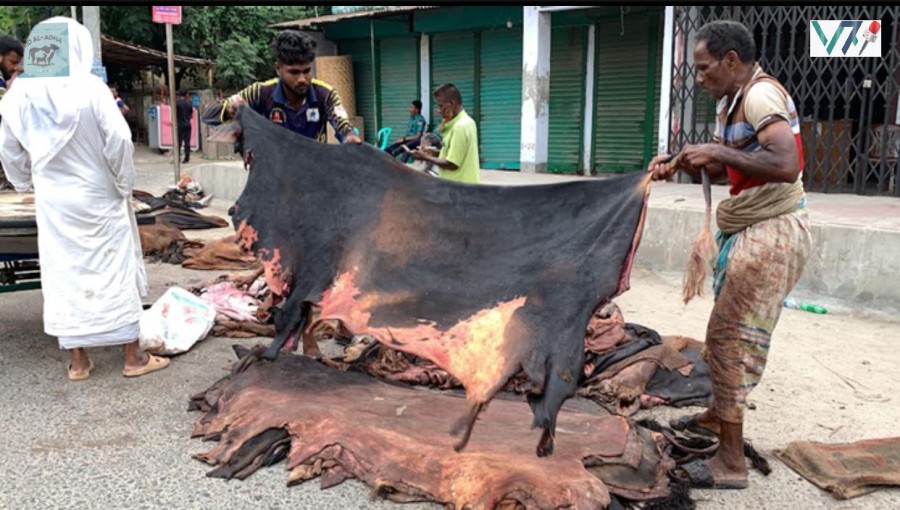
Photo: Voice7 News
Disheartened sellers in Rajshahi struggle with low prices for sacrificial animal hides, often giving away goat hides for free with cowhides, highlighting the ongoing crisis in the local leather market. Photo: Voice7 News
Sellers in Rajshahi are once again facing significant difficulties with the hides of sacrificial animals this Eid. Many have been forced to bury unsold hides or sell them at rock-bottom prices, with some even offering goat hides for free with the purchase of cowhides. Despite government efforts to regulate prices and prevent smuggling, the local market has seen little benefit, continuing a troubling trend from previous years.
Rajshahi june 20,(V7N)- This year, just like last year, sellers are facing difficulties with the hides of sacrificial animals. Many, unable to fetch a decent price, have buried the hides or sold them at extremely low prices. In some cases, buying a cowhide came with a goat hide for free.
On the second day of Eid, Azmat Ali went to sell a cowhide in the Supura area of the city. He was infuriated when the trader offered him only 600 taka for it. Despite his questions about the hide's worth, he received no satisfactory answers. Azmat Ali's experience is not unique; everyone in Rajshahi trying to sell hides after Eid is facing similar issues. Despite government initiatives to set leather prices and prevent smuggling during the Qurbani season, no one seems to benefit from these measures. Following a trend over the past few years, the leather market has once again collapsed.
This year, wholesalers bought cowhides of various sizes for Tk 200-700 each, and goat hides for Tk 5-10 each. In many cases, those who had both cows and goats received the goat hides for free with the purchase of cowhides. Sellers have not been happy with the prices of sacrificial animal hides this year. Even the hide of a cow worth up to one or two lakh taka didn't sell for more than Tk 700. Goat hides were often not accepted by traders at all. While a few sellers received 5 to 10 taka for goat hides on the first day of Eid, they had to give them away for free on the second day.
Additionally, for various minor reasons, many hides were returned as defective. Those who bought hides at higher prices without understanding the market saw their investments turn to dust. This situation was observed not only in the Supura area but also in Naodapara, Shalbagan, Darikhorbona, Laxmipur, Talaimari, and other surrounding areas.
Before Eid-ul-Adha, on June 3rd, the government set the price for sacrificial animal hides. In Dhaka, the price of salted cowhide per square foot was set at Tk 55-60, up from Tk 50-55 last year. Outside Dhaka, the price was set at Tk 50-55 per square foot, up from Tk 45-48 last year. However, despite the slight increase in hide prices compared to last year, this had no impact on divisional cities like Rajshahi or other districts.
Farid Hossain, a trader in the Shalbagan area of Rajshahi, said that the thriving business of raw cow and goat hides (without salt) is no longer there. This situation has persisted for at least 9 to 10 years. Although some value can be obtained from cowhides, goat hides have often been discarded after purchase. Wholesalers, citing various reasons, are reluctant to taka them. Thus, few people bought goat hides this year. Afraid of the hides rotting and emitting a foul smell at home, many gave them away for free. Most of the cowhides were bought for prices ranging from Tk 200 to 700. Last year, the maximum price was Tk 600. This year, with a slight increase in prices, traders paid a bit more. He also mentioned buying small and medium cowhides for Tk 200, 300, and 500 each.
Meanwhile, Md. Sohel, a seasonal leather trader from the Maldah Colony area, said he bought small, medium, and large hides thinking the prices were high. He bought 50 pieces of hides ranging from Tk 500 to 800 each. However, upon reaching the wholesale market in Supura, he realized his mistake. Unable to recover his investment, he sold the hides at a loss. Instead of profit, he couldn't even recoup the small capital he had invested in this seasonal business. The arduous task of going door-to-door to buy hides was in vain.
Asaduzzaman Masud, president of the Rajshahi Leather Traders Association, said that although the price of hides increased slightly compared to last year, it did not significantly impact the market. Not all hides were sold at a maximum of Tk 700; in some places, cowhides sold for up to Tk 1,000. However, the price of goat hides remains low, as always.
He explained that most people are not careful when removing goat hides, resulting in punctures, cuts, and damage. Therefore, wholesalers do not want to buy defective hides. The exact number of hides collected or traded this year is still unknown. Since most people sacrificed on the first day of Eid, it will take time to get accurate figures. Despite price variations, the supply was good, according to this leather trade leader.
END/V7N/RAR/DK/

Comment: